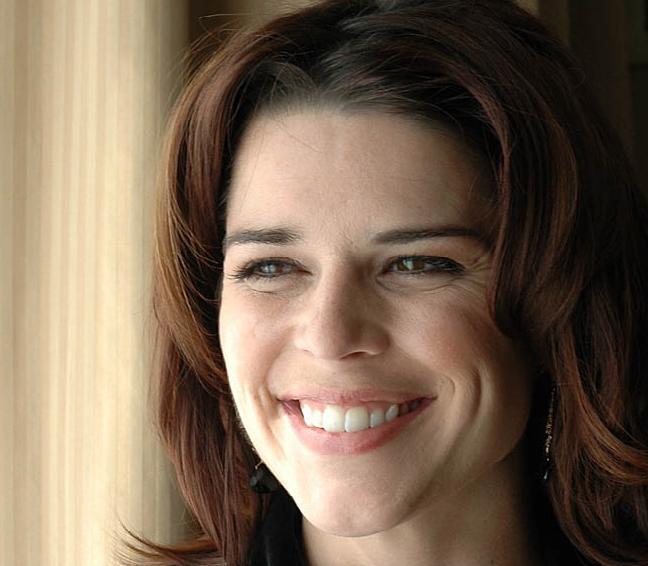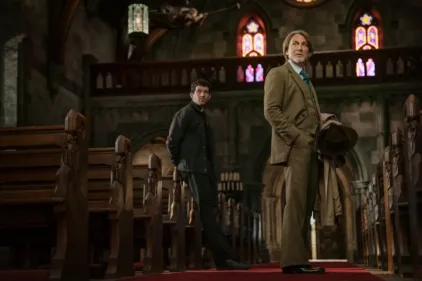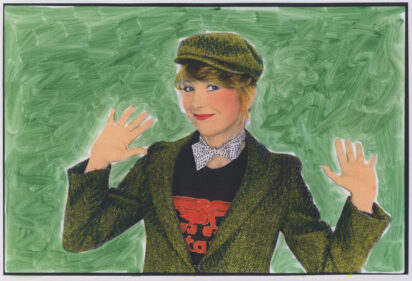TORONTO — “When Will I Be Loved” is about a young woman who accepts a million dollars from a rich man who wants to have sex with her. What the man doesn’t know is that she’s rich, too.
“Had she been poor this would have been a completely different film,” Neve Campbell was telling me. “It would have been about the money. We’ve seen that in a lot of films. But for her it’s not about the money, so it becomes this psychological game.”
Campbell plays the woman, named Vera, in a movie that is deceptive, intriguing, erotic and intelligent; it opens Friday, and gives Campbell scenes where her character responds in the moment, improvising poetic justice for one man who wants to sell her and another who wants to buy her. This film and Robert Altman‘s recent “The Company” are breakthrough roles for Campbell, moving her out of the “Scream“-queen category and allowing her to grow in unconventional roles. She makes intelligence sexy.
The movie’s psychological game involves three characters trying to con one another. Fred Weller plays Ford, a motormouth street kid, brilliant in a sleazy way, who is the girl’s lover. Campbell’s Vera enjoys the sex with him, responds to the excitement of his outlaw personality, even really likes him — until she realizes that he not only wants to sell her to an Italian billionaire, but cheat her on the payoff. Dominic Chianese plays the rich count, who Ford is trying to con. The count sees Ford with Vera, and asks Ford to arrange a meeting.
The film was written and directed by James Toback, a director who operates at the intersection of sex, money, crime and verbal persuasion. His characters often think they can enforce their will through the sheer weight and rush of words. That’s true of Toback, too; the late Spy magazine once ran a four-page fold-out charting his attempts to pick up a dozen Manhattan women, and the lines he used, the names he dropped, the compliments he paid and the strategies he employed. He is not shy about this aspect of his character, as his film “The Pick-Up Artist” acknowledged.
“When Will I Be Loved” operates in an entirely different arena, however. It’s the best film yet by Toback, who was the screenwriter of “Bugsy,” a movie about a man who essentially talked Las Vegas into existence. The film centers on an extraordinary scene in which Campbell and Chianese negotiate how much will be paid, how it will be paid, and what it will be paid for. This is not a crass scene. Vera and the count recognize each other as intelligent sophisticates, and as they negotiate for her body, they both take pleasure in the sheer audacity of what they are doing, and the verbal elegance with which they’re doing it.
“He’s not just a chump,” I said to Campbell. This was last week at the Toronto Film Festival.
“Right,” she said. “He has self-respect and intelligence.”
“So,” I said, “it’s not just the obvious angle where you would be twisting him …”
“… around my finger …”
“… sexually and so forth …”
“That’s why I loved it. Neither one is a victim. They’re two equals. The count is excited to find that the woman challenges him from a position of strength.”
“It must have been amazing when you read the script,” I said.
“Well, there were only 35 pages of the script originally,” Campbell said. “A lot of it was improvised. And Jim was writing in the evenings and bringing it to us in the morning. When he originally called me there was the scene with Dominic and there was the scene with Fred Weller when he was trying to manipulate me. But I was really impressed by those pages. It’s a rare thing to find someone in Hollywood who is able to have that knowledge of human nature and put it on paper without unnecessary words. I think he’s incredibly daring, and explores things to an extreme that most directors aren’t willing to go to. That first day we were supposed to meet for an hour; we met for 12 hours.”
I believed that, because Toback says he wrote the film for Campbell because he was obsessed with her. Well, of course he was. He’s obsessed as a way of life, and the movie opens with a scene where he plays a professor interviewing Vera for a job as his assistant. As they walk near the campus, she talks to a couple of guys and he suggests that she is thinking of picking them up. In response, she suggests that the whole interview was a device to get her to sleep with him. This not only establishes her character’s negotiating abilities before she meets the count, but also, I suspect, gives us an insight into their 12-hour meeting.
I talked to Toback right after talking to Campbell. I’d been offered the chance to talk to them together, but no, I’ve interviewed Toback many times over the years, and if there’s one thing I’ve noticed, it’s that nobody else gets to talk. Since he is brilliant, funny and a little mad, this is not a problem, unless you want to hear what the other person has to say.
Toback gave me an example of his improvisational method. There is an early scene where Vera and a girlfriend spontaneously make love. It’s not that they’re lesbians so much as that they’re sexual beings able to talk themselves into unexpected developments.
“When it came time to shoot that scene,” he said, “I told them to go into another room: ‘Take as long as you want. When you’re ready to shoot the scene come out, we’ll shoot it.’ They came out, and I didn’t even want to hear what they were going to do. They just planted themselves by the window and we shot the scene. And if you’d given me 10 weeks to come up with a list of 30 different scenes, I wouldn’t have been able to come up with one as good. And they would never have been able to do it as well because on some level, even though Neve and I had incredible harmony, she and certainly the other girl would have been asking, ‘Exactly why did he feel it was necessary to tell us what he wanted, instead of preferring to see what we wanted to do?’ And it never would have been the same thing.”
Improvisation sometimes leads Toback’s films into meandering byways. “When Will I Be Loved” is notable for the clockwork precision of the crucial scenes, in which Vera decides from moment to moment what she will do and how she will do it, and then, when there is an unexpected development, is able to turn on a dime and improvise a radical development that neatly turns the tables.
“A lot of people are saying she’s a femme fatale or a black widow,” Campbell said, “but I think she’s quite the opposite in a lot of ways. She’s not a woman who decides to take revenge, plots it out and accomplishes it. She’s a woman who is fascinated by human beings, fascinated by what makes them tick, fascinated by power, fascinated by how far people will go with their darkness to get what they want. She’s testing herself and she’s testing the others. And it’s moment to moment and she’s improvising every step of the way.”
“That’s what I love about it,” I said. “Usually when you see a con movie, at the end you wonder how they could have planned it all in advance and counted on everything happening according to schedule.”
“Yeah,” she said. “She doesn’t have a plan at the beginning and you can see it being created as she goes along.”
Campbell, who is still only 30, was born in Guelph, Ontario, and trained with the Royal Ballet of Canada before switching to acting at 20 with the TV series “Party of Five.” She had the good luck to play the victim in “Scream” (1996), an enormous box office hit that led, as such things do, to “Scream 2” (1997) and “Scream 3” (2000). But she was electrifying in the little-seen “Wild Things” (1998), a sexually charged thriller, and in the overlooked “Panic” (2000) she played a lesbian who becomes the confidant of a Mafia hit man (William H. Macy) after they meet in the waiting room of their shrink.
She had a personal triumph in Robert Altman’s “Company” (2003), playing a member of the Joffrey Ballet of Chicago in a film she co-wrote and co-produced. And now “When Will I Be Loved” is a calling card for roles of great emotional complexity.
“It’s been funny,” she said, “because people think I chose to be a horror film actress. ‘Scream’ was the first movie I got as lead, so that’s what I did, and it ended up becoming huge. But that was not the genre I chose. I don’t watch horror movies. I used to be really concerned about what the industry would think of me. When you first start out you have a lot of agents and managers and publicists giving you their opinion of what the next step should be. At some point I realized there’s no controlling it, that I should just go with my instincts. I think I have good instincts and so I’m finding people and scripts that I’ll be challenged by, where I feel I can grow as an actress.”
“Which you certainly did on ‘Company’.”
“I loved Robert Altman. I’m so passionate about that man, and with James and Robert, their egos don’t get in the way of the art. There are so many directors in Hollywood who want to think it was all their idea. They don’t invite their artists to bring their art to the table. But Robert and James want you to argue with them and suggest the new concepts and ideas. Altman creates worlds, you know. Robert to me is more of choreographer than a film director. He told me, ‘I’d rather direct 80 people than three,’ because 80 people gives him more room to breathe.”
I’d read that Campbell insisted on a clause in all her contracts that specified no nude scenes. That clause must have been missing from the Toback contract.
“Yeah,” she said, “I’ve had issues with nudity when I feel that the scenes have nothing to do with the film itself — when it’s solely for box office draw or for the titillation of the audience. But in this film, the power of this woman’s sexuality is what the story’s about, in a way. So it wouldn’t make sense to not see her in that way.”
Campbell smiled. “You know, I’ve had a lot of men say she’s twisted and she’s really dark. They don’t mention the fact that she was being manipulated by these terrible people. I’ve had a lot of women say they felt sorry for her and were grateful for the outcome.”
“Well,” I said, “she’s responding to the fact that the man she loves is willing to sell her, and this other man wants to buy her, and that’s how they both think of her.”
“Absolutely,” she said. “And the fact that a million dollars is not that important to the count is even more insulting.”
“In his mind,” I said, “he’s getting you for a cheap price.”
“Or he thinks he is,” she said.












